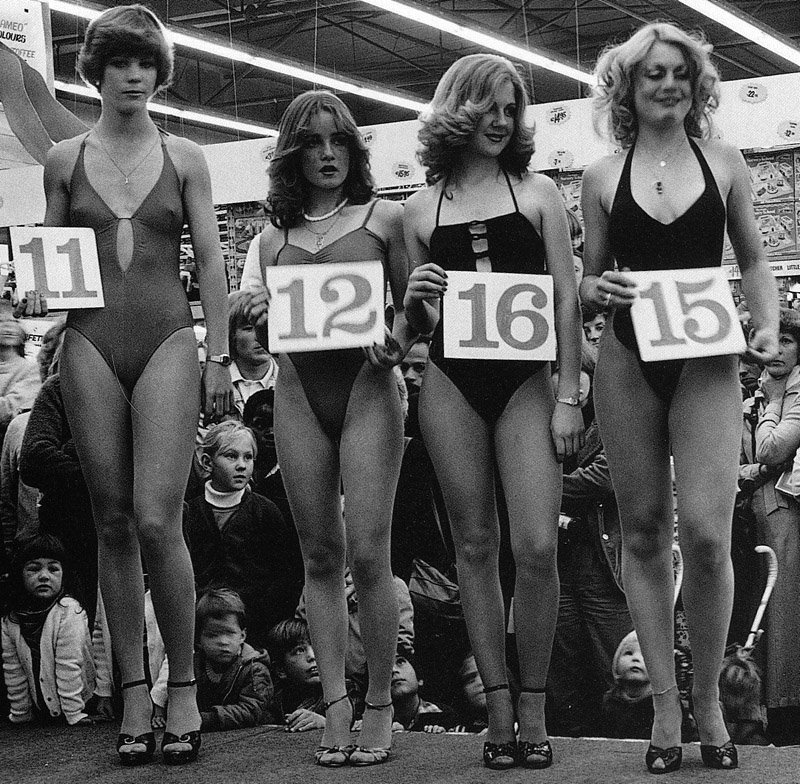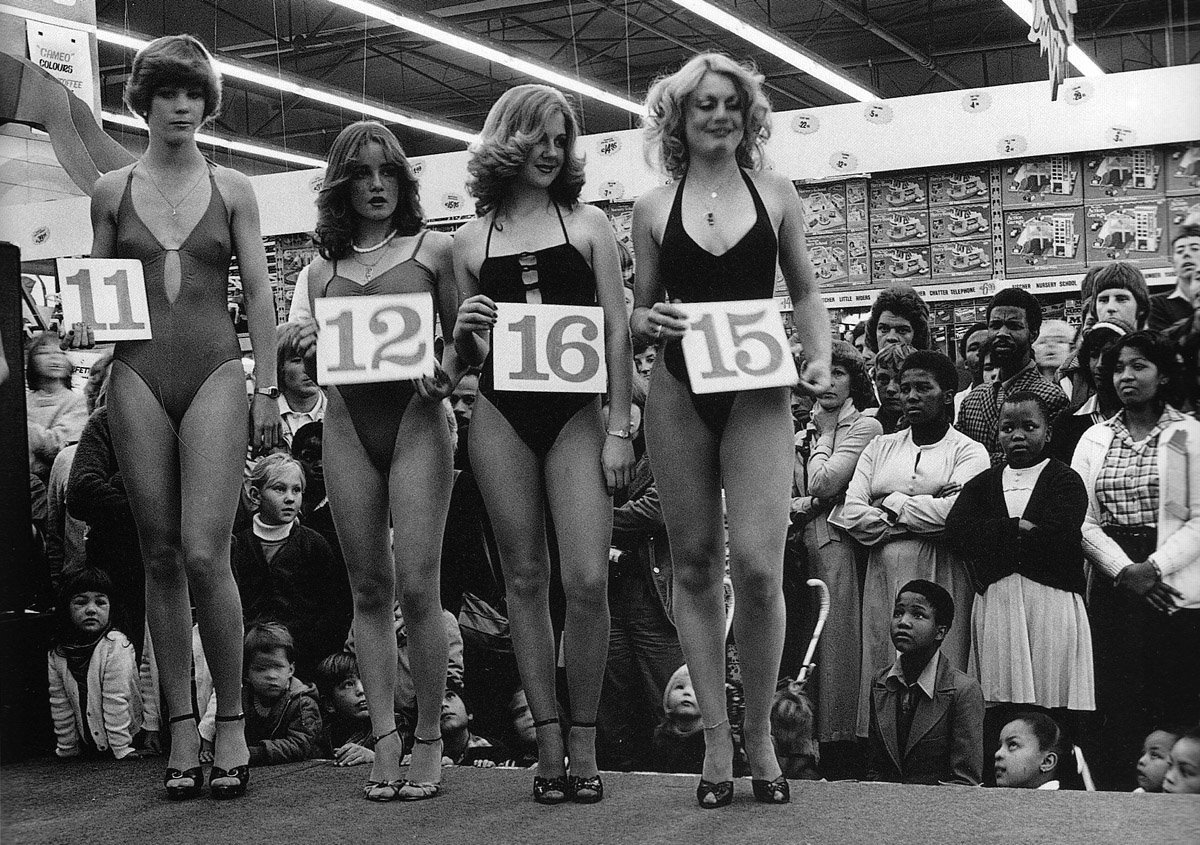Women on a stage.
In sexy high-heels no less.
The moment in this David Goldblatt image is different from our work. It is also similar.
Are these young women empowered?
Are they objects?
Are they there by conscious choice?
Is there a stage-parent pushing them?
Is the entirety of our culture a stage-parent pushing them?
So many thoughts about identity and other issues rush through your mind when you view the photo the way I’ve cropped it above.
In the wider cropping below those themes are still present… but… well… it’s a wider cropping!
It’s not Boise, Idaho.
Try Boksburg, South Africa.
1980.



Goldblatt photographed issues of social relevance and his cropping was done for a purpose. If you are South African you will remember that beauty pageants were for White people. The removal of the Black spectators by cropping destroys the value of the photo.
Thanks Keith – I totally agree!
My thought wasn’t to “remove” at all, but just to think about how the pageant by itself reflected so many other issues already, and then with the “correct” cropping of his photo, the still wider vision his work presented.
Thanks for stopping by!
Hi V. The issues you refer to, relevant as they now are, were not issues at all (or were still emerging) at the time the pic was taken. But there’s no sin in finding present day relevance in older pics !
huh… I think gender issues and identity ideas were relevant in 1980. I’m not claiming that they were David Goldblatt’s focus, I’m sure you’re right about that.
My cropping was sort of the way my own eye had experienced the photograph: first of the “foreground”… the pageant contestants… and then of the “background”… the local community. Obviously Goldblatt’s photograph was as powerful as it was simple a statement of race issues in that time and place. I didn’t mean to “replace” that with gender issues. But in a way, these ideas overlap I think, They’re both about identity. Who controls your identity? What identities are you “allowed” to occupy? etc.
I’m pretty sure we can agree, it’s a powerful piece of photography from a great eye.
PS: this is a pretty old post for me, from shortly after I started this blog. Haha, I’m amazed you can still see the photo at all, having survived moves from Blogger to WordPress.com to a self hosted WordPress to a WordPress multisite and finally to our present home as a WordPress single site at WP Engine! 😛
Anyway,
If I was doing the post today I would have been more responsible and included some links, like:
• David Goldblatt.com
• Wikipedia / David Goldblatt
• Goodman Gallery / David Goldblatt
• Victoria & Albert Museum / David Goldblatt
Depends where you grew up. Round these parts they were only becoming an issue in 1980. But the foreground/background thing – yes, that was certainly planned and deliberate. As for the rest of your comms, I couldn’t agree more. Stereotypes and societal roles are dictated by culture and usually serve a purpose, or sometimes `used’ to serve a purpose. When they get to the `used to’ point they become open to challenge, and change often follows. But like power, its never given – it has to be taken.
oh oh – so by 1980 gender issues may have been on the map in USA or parts of EU, but far less so in South Africa? That makes sense. I just read about the Celeste Coetzee incident (for example) in 2011.
http://galleryxue.tw/2011/12/05/celeste-coetzee/
Gender issues, and a spectrum of others, will probably always be a `work in progress’. Go into rural Malawi or the villages near Umtata in South Africa and see how far they have progressed. Emancipation of women, understanding of the social issues of AIDS, tolerance for same sex marriage, etc etc are pretty unheard of. Venturing down any of these paths leads to ostracisation and worse – the bludgeoning to death in recent years of numerous lesbians being a prime example. The USA and EU are both 1st World. RSA is a mix which creates one side advocating and encouraging change (with little deep understanding of the consequences of acceleration), and the other side supporting the status quo for (perhaps) practical reasons. Whatever the motivation, conflict and intolerance will certainly be part of change. It always has.
Wow, that’s pretty intense Keith. I don’t think the developed world or any country anywhere has a monopoly on Tolerance / Intolerance, I think you can, and probably always will be able to, find both anywhere you go. It’s a pretty crazy world with some reaching for the stars or into cyberspace, and others just trying to find a meal or a job and survive another day. Ironically, so many in the developed world where perhaps they don’t have a daily struggle to survive… play video games where they access a romanticized version of a daily struggle to survive. I suppose we’re wired to grapple with challenge and conflict.
Lol !. See where one `unstartling’ picture by Goldblatt can take one ? None of his pics will ever be the work of a `happy-snapper’. He’s very serious though – have a look at Obie Oberholtzer (another South African). Has done similar stuff but with a much lighter slant – makes you laugh sometimes, instead of cry. Enjoyed chatting with you. K